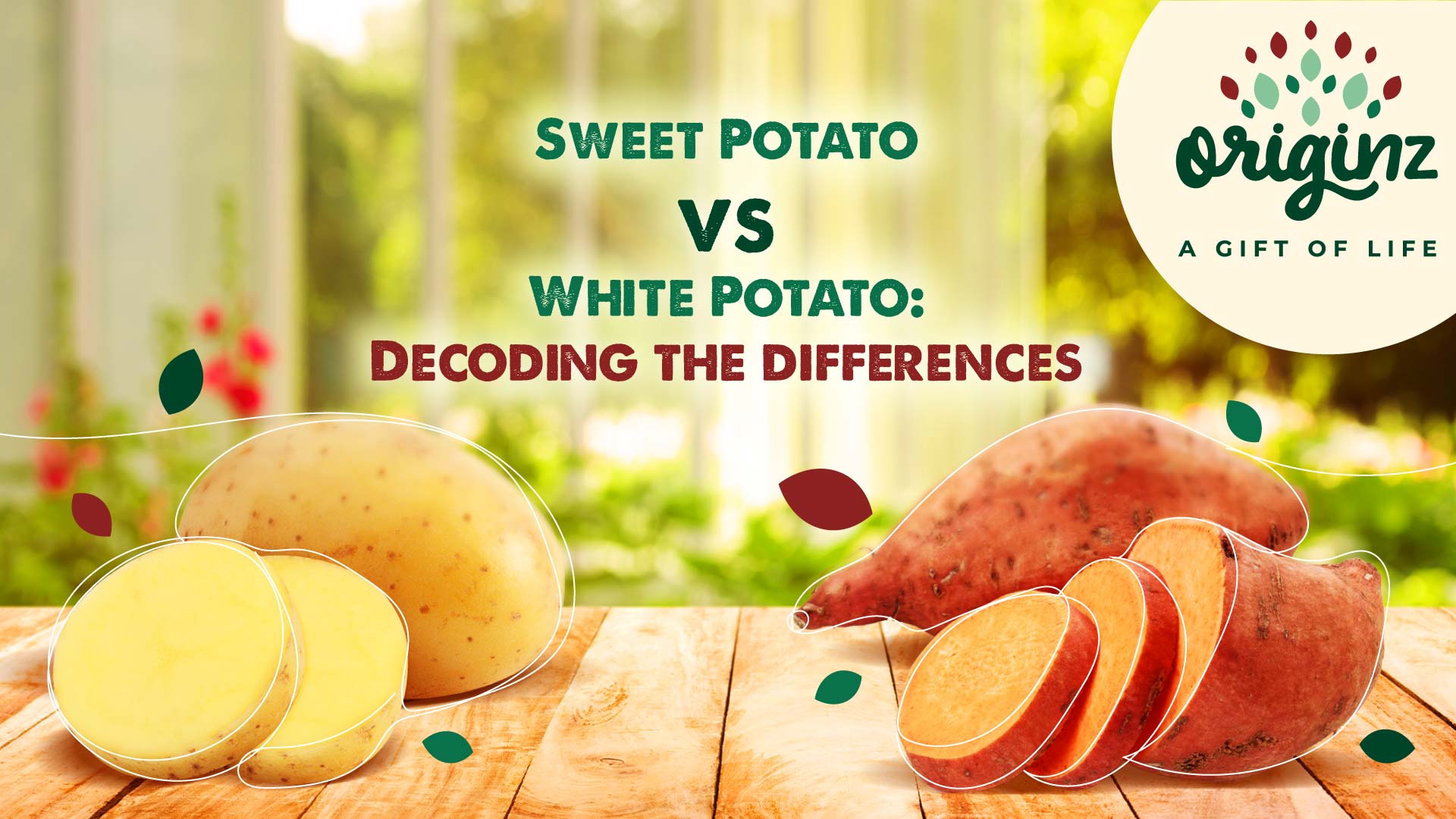
Sweet Potato vs White Potato: Decoding the differences
In the world of tubers, sweet potatoes and white potatoes stand out as popular choices with unique flavours, textures, and nutritional profiles. As versatile staples in many cuisines, these two potatoes often find their way onto our plates in various forms. However, the sweet vs white potato debate is more than just a matter of taste; it's about understanding the nutritional differences and health benefits each brings to the table.
Sweet Potato vs White Potato: A Culinary Clash
Let's begin by exploring the fundamental distinctions between sweet potatoes and white potatoes. The primary difference lies in their botanical origins and nutritional compositions. Sweet potatoes belong to the morning glory family, while white potatoes are members of the nightshade family.
Nutritional Value of Sweet Potatoes
Sweet potatoes are renowned for their rich nutritional content. Packed with vitamins and minerals, these vibrant tubers offer a range of health benefits. The orange-fleshed varieties, in particular, are high in beta-carotene, a precursor to vitamin A known for promoting eye health and supporting the immune system. The sweet potato's nutritional value extends to its high fibre content, which aids digestion and helps maintain a healthy gut.
Advantages of Sweet Potatoes
One of the key advantages of sweet potatoes lies in their lower glycaemic index compared to white potatoes. This means they cause a slower increase in blood sugar levels, making them a favourable option for those looking to manage their blood sugar. Additionally, sweet potatoes contain antioxidants that play a crucial role in combating oxidative stress and inflammation in the body.
Sweet Potato Benefits
The benefits of incorporating sweet potatoes into your diet are manifold. They are an excellent source of complex carbohydrates, providing a sustained release of energy, making them a great option for athletes and those with active lifestyles. The high levels of vitamins A and C in sweet potatoes contribute to radiant skin and a boosted immune system, respectively. Moreover, sweet potatoes contain manganese, an essential mineral that aids in collagen production, promoting healthy skin and joints.
Health Benefits of Sweet Potatoes
The health benefits of sweet potatoes extend beyond their impressive nutritional profile. Research suggests that the antioxidants in sweet potatoes may have anti-cancer properties and contribute to overall longevity. The presence of anthocyanins, the pigments responsible for the purple colour in some sweet potato varieties, has been linked to improved cognitive function and reduced inflammation.
Understanding White Potatoes
While sweet potatoes take the spotlight for their nutritional prowess, white potatoes have their own set of attributes to offer.
Nutritional Value of White Potatoes
White potatoes are a good source of essential nutrients like potassium, vitamin C, and vitamin B6. Potassium is vital for maintaining healthy blood pressure levels, and vitamin B6 is crucial for brain development and function. While white potatoes may not boast the vibrant colours associated with sweet potatoes, they still contribute valuable nutrients to a balanced diet.
Sweet vs White Potato: Making Informed Choices
Choosing between sweet potatoes and white potatoes ultimately depends on individual preferences, dietary goals, and health considerations. Sweet potatoes shine when it comes to vitamin A content, lower glycaemic index, and antioxidant levels. On the other hand, white potatoes offer potassium, vitamin C, and vitamin B6. The key is to strike a balance and enjoy both in moderation as a healthy food snack.
FAQs
Q: Can sweet potatoes and white potatoes be part of a healthy diet?
A: Absolutely! Both sweet potatoes and white potatoes can be included in a balanced diet.It's essential to consider individual nutritional needs and preferences.
Q: Are sweet potatoes better for managing blood sugar levels?
A: Sweet potatoes have a lower glycaemic index compared to white potatoes, making them a preferable choice for those looking to manage blood sugar levels. However, portion control and overall diet play significant roles.Q: What are the different ways to incorporate sweet potatoes and white potatoes into meals?
A: Sweet potatoes and white potatoes are incredibly versatile. They can be roasted, mashed, boiled, or baked. Try making sweet potato fries or a classic mashed potato dish for variety.Q: Are there any specific health conditions that dictate a preference for sweet potatoes or white potatoes?
A: Individuals with specific health conditions, such as diabetes, may benefit from the lower glycaemic index of sweet potatoes. However, it's always advisable to consult with a healthcare professional or a registered dietitian for personalised dietary recommendations.In the sweet potato vs white potato showdown, there's no clear winner – it's more about making informed choices based on your nutritional needs and taste preferences. Both tubers offer unique advantages and incorporating a variety of foods into your diet ensures a well-rounded approach to nutrition. So, whether you're savouring the sweetness of a roasted sweet potato or indulging in the creamy texture of mashed white potatoes, you can enjoy the best of both worlds.
Latest Blogs

Maintaining Healthy Habits After Ramadan
Have Ramadan healthy meals after Ramadan and maintain healthy food habits and implement them in your daily lives. Read more about healthy food habits.

Authentic Middle Eastern Iftar Meals to Prepare This Ramadan
Prepare some authentic middle eastern iftar meals this Ramadan. Look for fresh Ramadan food ideas and make your day memorable with these dishes. Check them out.

Ramadan Dishes to Cure Fasting Fatigue
Don’t worry about fasting fatigue anymore as we have listed some best Ramadan dishes and easy iftar meals to support your fasting journey. Check them out.

Eid-al-Fitr Feast: Delicious Recipes to Celebrate the End of Ramadan
Celebrate the end of Ramadan with delicious recipes on the eve of Eid ul Fitr. Read more about the traditional Ramadan recipes and make them easily.